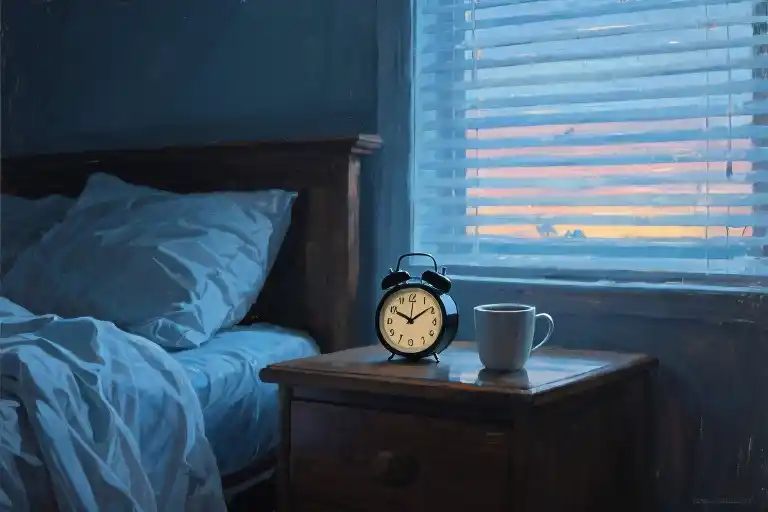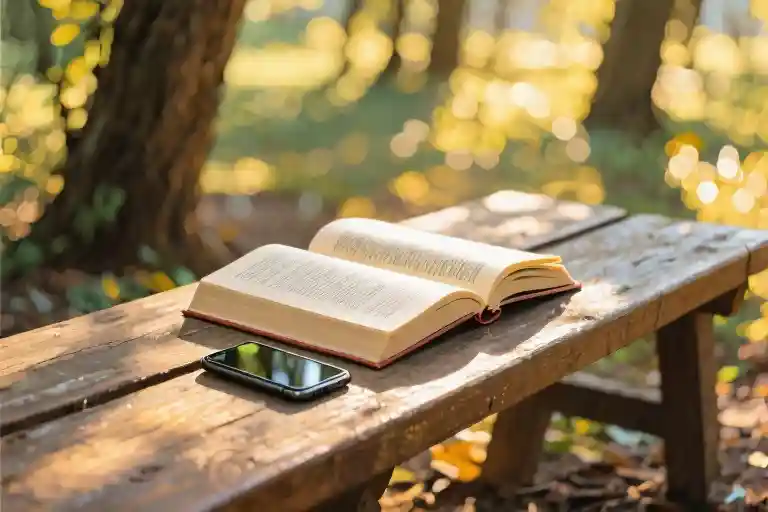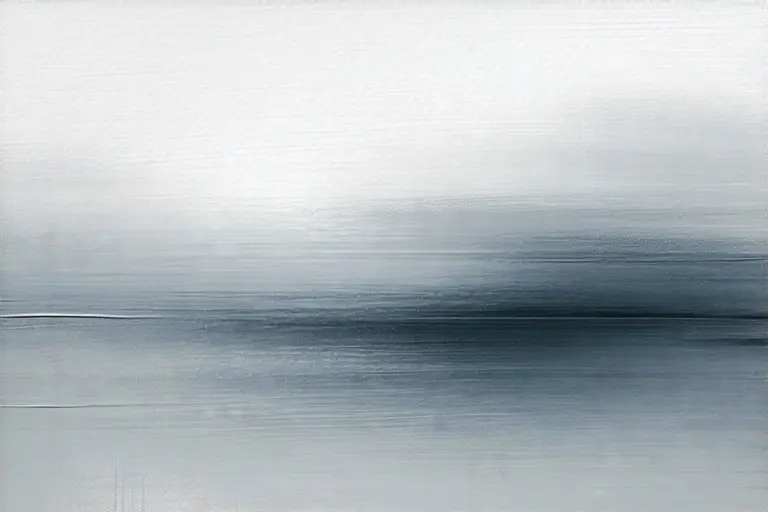The alarm hasn’t gone off yet, but you’ve been awake for seventeen minutes. That precise kind of wakefulness where you count ceiling cracks instead of sheep, where the digital clock’s glow feels like an accusation. 5:23 AM. The terrible magic of adulthood isn’t insomnia—it’s this crystalline awareness of why you dread the coming day.
Your phone buzzes with yesterday’s unfinished conversations. Three unread messages from your mother, five from the group chat you’ve been ignoring, one from HR about ‘mandatory fun’ Friday. The pillow smells faintly of the shampoo you bought hoping it would make mornings easier. It didn’t.
Remember when dawn used to taste like possibility? That summer after college where you’d wake before sunrise just to feel the world breathe? Now sunlight through the blinds doesn’t promise adventure—it illuminates the dust on your nightstand, the unpaid bills, the way your hands hesitate before reaching for the day.
This is the quiet unraveling they never warn you about. Not dramatic breakdowns, but the thousand paper cuts of existence: replying ‘Doing great!’ to coworkers while your coffee goes cold, laughing at parties while mentally drafting apology letters to your younger self. The cruelest part? How convincing you’ve become at performing okayness. Your Instagram shows brunch photos, not the 3AM searches for ‘why does my chest hurt when I’m not sick.’
We’ve built entire civilizations but still can’t articulate this specific loneliness—the kind that persists in crowded rooms, that turns ‘How are you’ into a rhetorical question. Some mornings you stare at your reflection brushing teeth and wonder when your eyes started looking like a stranger’s. The bathroom mirror fogs with steam but never obscures enough.
Yet here’s the secret they don’t tell you about heavy mornings: the very fact you notice their weight proves you haven’t gone numb. That dull ache beneath your ribs? It’s not just fatigue—it’s the remnant of a heart that still expects more. The same organ that once quickened at sunrise now protests its muted existence. This isn’t depression speaking (though it might whisper nearby), but your stubborn humanity refusing to settle.
Outside, a garbage truck beeps its morning ritual. Somewhere, a dog barks at nothing. The world keeps its appointments while you calculate how many hours until you can reasonably return to bed. But in this suspended moment before the alarm screams, there’s an unexpected mercy: for now, in the blue-dark between night and day, you’re neither who you were nor who you’re becoming. Just a person existing exactly as you are—weary, wired, wonderfully unedited.
Perhaps that’s the real adulthood revelation: not that life gets heavier, but that we stop pretending it doesn’t. The courage isn’t in always springing out of bed, but in occasionally admitting we’d rather stay buried under the covers. And maybe—just maybe—that admission is the first step toward mornings that feel less like surrender.
The Adults Trapped in Morning Light
The alarm hasn’t gone off yet, but you’re already awake. That heaviness settles in your chest like a soaked towel someone forgot to wring out – not enough to stop your breathing, just enough to make each inhale require conscious effort. Outside, the first birds begin their rehearsals, but their songs feel like accusations today.
Remember when mornings used to be different? Back in college, you’d leap out of bed to photograph sunrises, chasing that perfect golden hour shot where everything looked dipped in honey. Now you calculate how many minutes remain before the alarm screams, pulling the comforter tighter as if it could shield you from daylight’s demands. The same hands that once eagerly adjusted camera lenses now fumble with blackout curtains.
This isn’t about missing youth’s energy – that’s too simple. The real tragedy lives in knowing exactly when things shifted. Somewhere between paying bills and attending obligatory gatherings, your nervous system rewired itself. Joy didn’t disappear; your capacity to feel it did. Like taste buds numbed by too much salt, the flavors of life now register as faint impressions rather than vibrant experiences.
What makes the weight particularly cruel is its invisibility. Co-workers compliment your punctuality, unaware you’ve been sitting in the parking lot for twenty minutes gathering strength to turn the doorknob. Friends envy your ‘consistent routine,’ not realizing the military precision of your mornings exists solely to avoid unstructured moments where emotions might breach the surface. You’ve become fluent in the dialect of fine: “Doing great!” “Never better!” “Just tired!” – all delivered with Oscar-worthy smiles while your ribs cage that sodden towel heart.
We don’t lose happiness all at once. It leaks out slowly, drop by drop, through the cracks of unmet expectations and accumulated disappointments. One day you notice the reservoir is low, then empty, then somehow still depleting further into negative space. The cruelest part? No one sends a warning when you’re about to cross into emotional overdraft. There’s no bank statement for the soul.
Yet here’s the secret they don’t tell you about heavy hearts: their weight proves their working. That ache when you see children laughing? That’s your capacity for joy, not dead but dormant. The pang watching couples hold hands? Your love language knocking from within, not extinct but exiled. We mistake the numbness of overload for emptiness, when really it’s the psyche’s circuit breaker tripping to prevent permanent damage.
Perhaps this explains why mornings became the battlefield. Dawn is nature’s reset button, offering what should feel like a daily chance to begin again. But when you’re running on emotional fumes, each sunrise doesn’t signal renewal – it highlights the unchanged terrain of your inner world. The sun keeps rising, but something in you refuses to follow its lead.
The Silent Collapse Behind Closed Doors
The conference room hums with the sterile buzz of fluorescent lights. You nod along to another PowerPoint slide, your lips curving on autopilot while fingernails carve crescent moons into your palm. This is modern adulthood’s open secret – our ability to hemorrhage internally while maintaining pixel-perfect exteriors.
A Lancet Psychiatry study reveals nearly 23% of high-functioning professionals meet clinical criteria for depression while maintaining above-average work performance. The numbers whisper what our Instagram feeds scream: emotional exhaustion has become the baseline condition of contemporary life. We’ve mastered the art of packaging despair into socially acceptable portions – deleting vulnerable tweets at 2am, laughing just a beat too loud at happy hour, answering “How are you?” with variations of “Swamped but great!”
There’s a particular loneliness in being surrounded by people yet feeling fundamentally unseen. It’s scrolling through your contacts at midnight realizing no one gets the full picture. The colleague who compliments your presentation doesn’t see the shaking hands beforehand. The barista who remembers your coffee order doesn’t know you cried in the parking lot. We become experts at performing wellness, our true selves buried under layers of “I’m fine” scripts.
If you’ve ever canceled plans last minute because pretending became unbearable, if you’ve rehearsed conversations in the shower that never happen, if your camera roll shows only curated happiness while your search history reveals “why does everything feel meaningless” – this is your confirmation slip. The receipt proving you’re not malfunctioning, but responding logically to an overwhelming world.
The cruelest paradox? The better we get at this emotional sleight-of-hand, the more isolated we become. Each polished performance builds higher walls, until we’re trapped in self-made fortresses of solitude. Our suffering becomes a poorly kept secret – everyone suspects but nobody acknowledges, like some collective game of emotional chicken.
Yet in quiet moments, the mask slips. Maybe when a stranger holds the elevator door a second longer than necessary. Or when a song from college drifts through a coffee shop. These tiny fractures in our armor reveal the universal truth: beneath every “I’ve got this” lies someone who occasionally doesn’t.
A Love Letter to Another Life
The morning light in this imagined life doesn’t stab at your eyelids like broken glass. It arrives gently, the way steam curls from a teacup – visible but weightless. The sheets feel like they’re holding you, not trapping you. Somewhere beyond the window, a sparrow practices the same three-note song it’s been perfecting all summer, and for once, the sound doesn’t grate against your nerves.
I hope your coffee tastes like something other than bitterness. I hope the shower water finds the perfect temperature on the first try. I hope your socks don’t bunch up inside your shoes, and I hope your keys wait patiently in the pocket where you left them. These are the tiny mercies that could make a morning bearable.
I hope someone notices when you enter a room, not because you’re loud, but because their eyes have learned to search for you. I hope they remember how you take your tea, and that you hate the sound of metal scraping against teeth, and that rainy afternoons make your knees ache. I hope your silences feel comfortable instead of guilty, and that when you do speak, the words land softly in hands that know how to hold them.
You shouldn’t need to justify taking up space. The way your laugh bursts out unexpectedly during serious moments, the particular way you mispronounce ‘espresso’, even those mornings when you wake up already tired – none of these things require an apology. You don’t owe the world constant productivity or perpetual cheer. Some days, getting out of bed and remembering to eat is victory enough.
Maybe in this other life, the mirror shows someone you recognize. Maybe the reflection matches the person you feel like inside – not younger or older, not thinner or more put together, just unmistakably you. And when you catch sight of yourself unexpectedly – in a shop window, or the darkened screen of your phone – it doesn’t send you spiraling into a list of everything you’d change.
I hope your phone fills with messages that don’t demand anything. I hope your inbox holds more ‘thinking of you’s than ‘following up’s. I hope your calendar has blank spaces that stay blank, and that no one makes you feel guilty for protecting them.
This imagined morning doesn’t require grand gestures or dramatic transformations. The peace comes from ordinary details: toothpaste that doesn’t dribble down your chin, a commute without unexpected delays, the satisfaction of crossing off the first item on your to-do list before 10 AM. It’s the absence of dread pressing against your sternum when you check the time.
You’ve spent lifetimes apologizing – for needing help, for taking breaks, for occupying room at the table. In this other version of events, you understand that survival isn’t the highest form of existence. Breathing shouldn’t feel like an accomplishment. Waking up shouldn’t require bravery.
So here’s what I know, even if you can’t believe it yet: You don’t need to earn your place here. The world doesn’t give out kindness in proportion to productivity. Somewhere, in some version of reality, there’s a morning waiting where you open your eyes and think ‘This is enough. I am enough.’ And until you find it, I’ll keep writing these letters to the life you deserve.
The Letter to Your Future Self
The weight of unspoken words often feels heavier than the silence they leave behind. There’s a particular kind of loneliness that comes with adulthood – not the absence of people, but the presence of conversations that never happen. You learn to edit your thoughts before they leave your lips, smoothing the edges of your truth until it fits neatly into polite small talk.
Yet somewhere between the coffee runs and calendar notifications, between the automated birthday wishes and strategically timed emoji replies, there remains a version of you that still believes in handwritten letters. Not the kind you send, but the kind you save – words meant for your eyes only, written by your own hand on mornings when the truth refuses to be compartmentalized.
Today, try this: take out any scrap of paper – the back of a receipt, the margin of a meeting agenda – and write one sentence to the person you’ll be five years from now. Don’t overthink it. Let it be imperfect, maybe even incomplete. It could be as simple as “I hope you finally bought those yellow curtains” or as raw as “Does it ever get easier?”
This isn’t about manifesting or productivity hacks. It’s about creating a tiny bridge between the you who’s struggling to get through today and the you who’ll eventually stand on the other side of this season. That future self might not remember how heavy your eyelids felt this morning, how your shoulders ached from carrying unexpressed emotions, how you rehearsed conversations in the shower that never happened. But they’ll hold proof that you showed up for yourself even when it felt pointless.
Somewhere in the world right now, someone is folding a similar note into a wallet or taping it to a bathroom mirror. They’re whispering the same silent prayer – that when their future self discovers this message, it won’t resonate anymore. That the pain described will feel foreign, the fears outdated. But even if it still stings, there’s comfort in knowing someone once understood – even if that someone was just you.
The world owes you tenderness it may never deliver. But this small act – pressing ink onto paper without worrying about grammar or solutions – is a way to claim some of that kindness for yourself. Not the Instagram-friendly version of self-care, but the quiet rebellion of admitting “I exist right now, and it’s hard.”
So write it down. Then tuck it away where time can’t erase it. Let future you discover these words when they least expect it – maybe on a random Tuesday, maybe during another difficult season. They’ll recognize the handwriting before the meaning registers. And for one fleeting moment, across the years, you’ll have kept a promise to yourself: that no matter how many people come and go, you’ll always have your own back.
Because people like us – the ones who feel too much and say too little – we deserve witnesses to our silent battles. Even if that witness is just our future self reading an old note with shaking hands, whispering back across time: “I remember. I’m here. We made it.”





